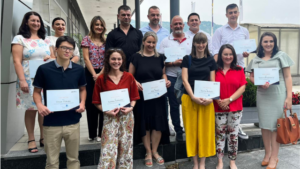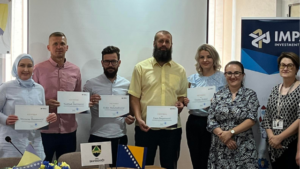After YEF, YEP participates another important exchange between practicioners in the employment field “How to break the curse of unemployment in the Western Balkans—jobs first or skills first?“. This debate foster a lively exchange to share new ideas, knowledge, and lessons on the problem of high unemployment in the Western Balkans. The format of the discussion is as follows:
1. Opening statements by moderator, Johannes Koettl
2. Opening statements by discussants, Omar Arias and Wolfgang Fengler
3. Open for comments from participants (feel free to post ideas, examples, and/or questions)
4. Closing statements by discussants, Omar Arias and Wolfgang Fengler
5. Closing/summary by moderator, Johannes Koettl
In short, the Western Balkans has not yet completed their transition to a modern economy that is led by private sector job creation. Today’s question for debate is where the solution lies? Are the binding constraints on the labor demand side, where overly stringent regulations, limited access to credit, and excessive taxation hinder private firms to create more jobs? Or are the binding contrariness on the labor supply side, where de-skilled older workers and younger workers with the wrong education cannot meet the expectations of employers in terms of technical and cognitive skills, but also in terms of soft skills like work ethics, self-motivation, conscientiousness and entrepreneurship, to name just a few.
To answer this question—jobs first or skills first—we have two outstanding World Bank economists here today to lead the discussion. On one side of the debate we have Wolfgang Fengler, Lead Economist from the Trade and Competitiveness Global Practice, who will argue for a policy agenda that is first and foremost focused on competitiveness as the answer to combat unemployment in the Western Balkans; and on the other side of the debate we have Omar Arias, Lead Economist from the Social Protection and Labor Global Practice, who will argue for a more nuanced policy agenda that puts an emphasis on ensuring that workers have the right skills for modern labor markets as the answer to combat unemployment in the Western Balkans.
The format of the debate will be that Wolfgang and Omar will post their opening statements today, November 17, at 9 AM Washington time. After that, I would like to invite everyone to comment on the opening statements and, over the course of the next two days, engage your fellow contributors in a lively online debate. Feel free to post ideas, examples, and/or questions. Wolfgang and Omar will post their closing statements before Wednesday, November 19, afternoon.
Moderator Johannes Koettl is a Senior Economist at the World Bank’s Social Protection and Labor Global Practice (GSPDR) and a Research Fellow at the Institute for the Study of Labor (IZA) invited all guests to check out a blog post from Ranko Markus, Team leader of the Swiss-funded Youth Employment Project on unemployment and inactivity in Bosnia and Herzegovina, which has been written, as reflection to the 6th Youth Employment Forum.
| Discussant |
 |
Wolfgang Fengler is the World Bank’s Lead Economist in Vienna. Previously, he served as the World Bank’s Lead Economist in the Nairobi office. A native German, Wolfgang has been a staff member of the World Bank for almost 15 years, during which time he has worked at its headquarters in Washington DC, as a Senior Economist in its Indonesia office, as Lead Economist in Kenya, and currently in Vienna where he covers Southeast Europe. He has published extensively on social and economic issues, including on global demographic trends. He published “Realizing the Kenyan Dream”, a collection of his blogs and articles, and co-authored “Delivering Aid Differently” (Brookings) and “Africa’s Economic Boom” (Foreign Affairs). Prior to joining the World Bank, he set up Africa Consulting, LLC, and was a Fellow at the Research Institute for International Relations. Wolfgang gained a PhD from the University of Hamburg (Germany). |
| Discussant |
 |
Omar Arias is currently the Practice Lead Economist for the World Bank Social Protection and Labor Global Practice. Previously he was Acting Sector Manager and Lead Economist in the Human Development Economics Unit for the Bank’s Europe and Central Asia region during 2011-2013, Sector Leader of Human Development for Bolivia, Chile, Ecuador, Peru and Venezuela during 2008-2011, a Senior Economist in the Poverty and Gender Group of the Latin American region between 2003 and 2007, and during 1999-2003 was a research economist in the Inter-American Development Bank. He has been a coauthor of various analytical studies, including recent regional reports on Jobs “Back to Work: Growing with Jobs in Europe and Central Asia” and on Pensions “The Invertying Pyramid: Demographic Challenges to Pension Systems in Europe and Central Asia”, “Strengthening Skills and Employability in Peru”, Latin America regional flagship reports “Informality: Exit and Exclusion” and “Growth and Poverty Reduction: Virtuous and Vicious Circles”, and analytical reports on returns to skills in Poland and Bulgaria, informality in Argentina and poverty in other Latin American countries. He has peer-reviewed publications in various topics, including returns to schooling and skills, labor markets, income mobility, growth, poverty and inequality, human capital accumulation, tax evasion and applied econometrics. He was a Fulbright scholar in the University of Illinois at Urbana-Champaign where he obtained his Ms. and PhD in economics. |
| Moderator |
 |
Johannes Koettl is a Senior Economist at the World Bank’s Social Protection and Labor Global Practice (GSPDR) and a Research Fellow at the Institute for the Study of Labor (IZA). He has been working on issues related to labor markets, migration, health, and social protection at the World Bank since 2004. Previously, he completed an M.A. in International Relations at Johns Hopkins University’s School of Advanced International Studies and a Ph.D. in Economics at the University of Vienna and the Institute for Advanced Studies (IHS) Vienna. He has published on issues related to social protection for international migrants, informal employment, work disincentives, and labor policies in Europe. Currently, he is co-leading the preparation of the ECA flagship report on aging. |








